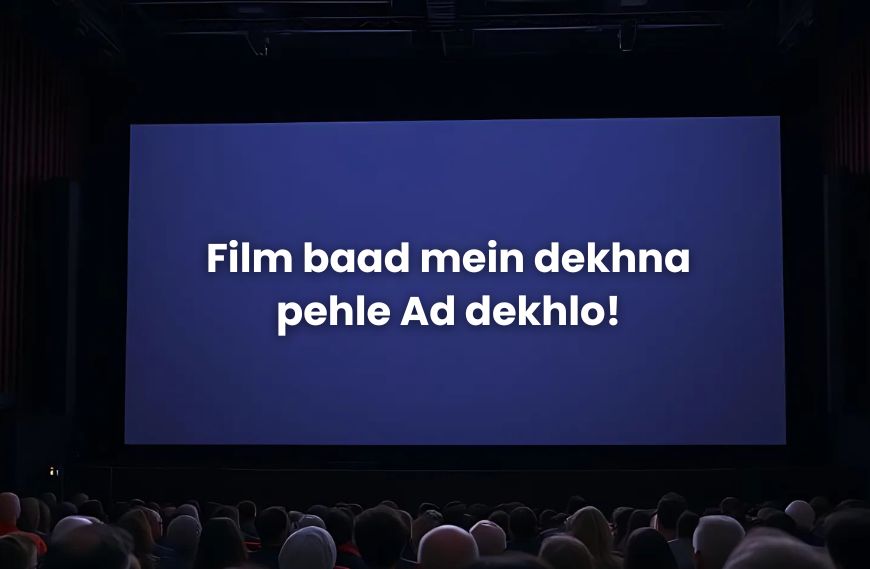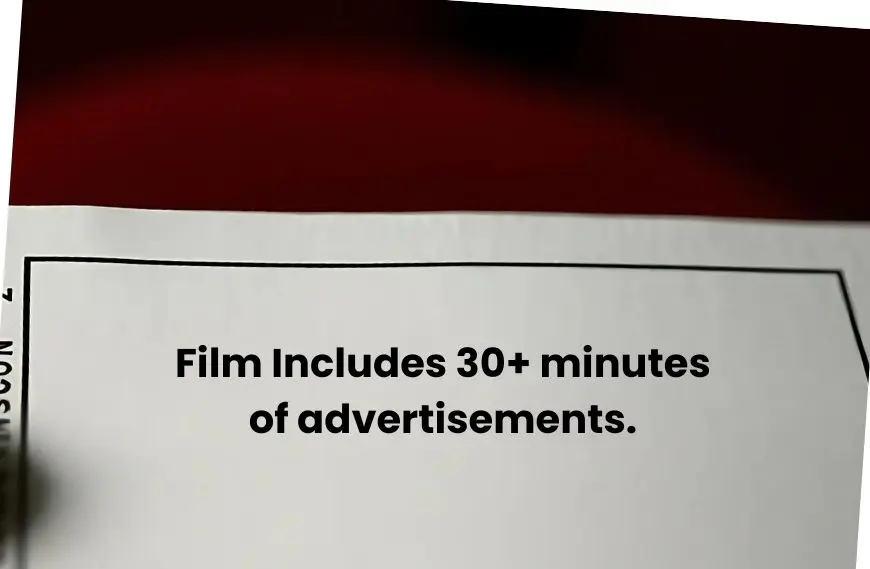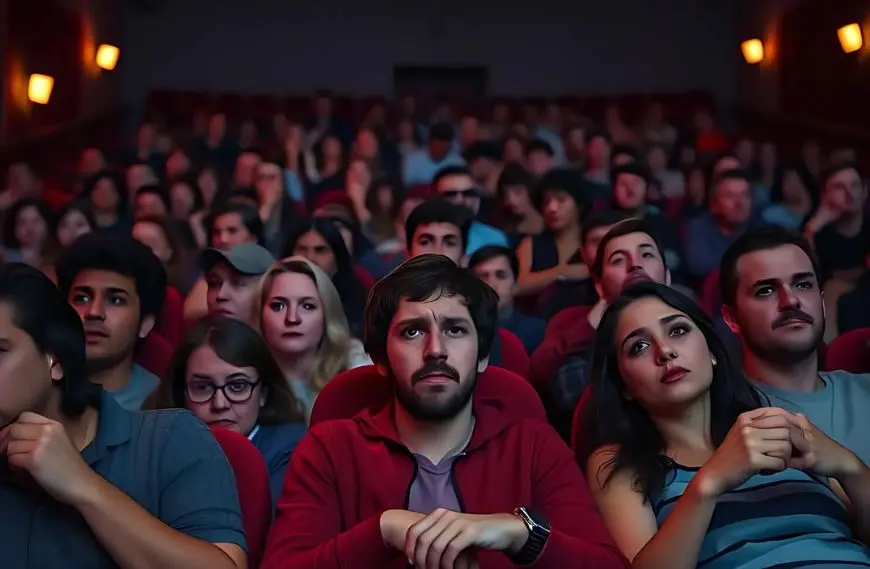Listen up! Are you heading to the cinema to watch a movie? Is it a big budget film with a superstar cast? That ticket must have cost you at least ₹900, right? Premium theatre, premium price!
Well, same here! I just booked my ticket, and trust me, it was not cheap. ₹793 with gst for a single ticket!
And yes, I am talking to you, the one who waits the entire week for a movie night, for a weekend outing, for a nice lunch and dinner. The one who plans their schedule like an expert.
But tell me honestly, has your entire plan ever fallen apart just because of a movie?
No, I am not talking about a bad film. I am talking about the real torture before the film even begins. Yes, you guessed it right! The never ending cinema ads.
Soap ads, fairness cream ads, liquor ads, burger ads, car ads, and god knows what else!
I can bet you feel the frustration. That thought must have crossed your mind:
‘Yaar, kis musibat mein aa gaya?’
The same ads I see on TV and YouTube, now I have to watch them in a cinema too? And that too after paying ₹900 for a ticket? It feels like there is some unwritten rule for cinema lovers. If you want to watch a film, you must suffer through a series of ads first.
It seems like theatres do not earn enough from our ticket money, so they have turned to ads to fill their pockets.
They have no respect for their own time, and guess what? They do not care about your time either.

I understand, ads during the interval are still acceptable. But before the movie? Seriously? If a film is scheduled for 8:30 PM, why does it actually start at 9:00-9:15 PM? What is the point of announcing a showtime when the first 30 minutes are hijacked by ads?
That is enough time to watch an entire Tom and Jerry episode, and maybe even a second one, before the film even begins!
By the time the movie finally starts, one full box of popcorn is already gone!

Let me share an experience with you.
I went for a first day, first show screening. The showtime? 6:45 AM. The movie? Dunki.
Now, guess when the actual film started?
7:45 AM! Yes, a whole hour wasted watching nothing but ads.
Audience started shouting, protesting. The frustration was real. Imagine waking up early, rushing to the cinema, expecting to enjoy the film, only to be bombarded with a never ending stream of commercials!
Now think about those who had to review the film in the morning itself. They planned everything, thinking they’d finish watching and get their review out before others. But thanks to this ridiculous ad marathon, when do you think they actually got to review it?
And the best part? The theatre management did not even bother to apologise. No announcement, no sorry, nothing. As if our time has no value.
Now tell me, what would you do in such a situation?
So today, let us talk about this. How do these ads kill your excitement for the movie? And how do they disconnect you from the experience you actually paid for?
Because let us be honest, we came for the movie, not for an ad marathon!
Evolution of cinema advertising
To understand how we have arrived at this point, let us take a brief journey through the history of cinema advertising.
1896: The Lumiere brothers, pioneers of early cinema, produced one of the first known cinema advertisements for Sunlight soap. This short film depicted Mrs Lumiere and a maid using the product, marking the advent of on-screen advertising.
1904: They continued this trend by creating a 90-second documentary for Moet et Chandon champagne, showcasing the production process from grape harvest to distribution.
1913: Nils Granlund, the advertising manager for the Marcus Loew theatre chain, produced a short promotional film for the musical The Pleasure Seekers, marking one of the earliest instances of a trailer shown in American theatres.
1920s: Cinema advertising gained momentum, with reports indicating that by 1920, approximately 50% of cinemas were incorporating advertising programmes into their screenings.
1930s: The introduction of sound in films revolutionised cinema advertising, allowing for audio-enhanced commercials that captivated audiences more effectively.
1960s: Companies like Pearl and Dean in the UK began specialising in cinema advertising, establishing structured approaches to on-screen promotions.
2009: The advent of digital projection technology enabled more dynamic and flexible advertising content, including the introduction of 3D advertisements alongside 3D films.
2023: Programmatic advertising made its way into cinemas, with companies like National CineMedia launching data-driven ad placements across thousands of screens, allowing for targeted and efficient audience engagement.
Over the decades, what began as occasional promotional content has evolved into a significant revenue stream for cinemas, often at the expense of audience satisfaction.

Legal and consumer rights issues
The frustration of prolonged pre-movie advertisements is not just a topic of casual conversation. It has escalated to legal challenges. A notable case emerged in Bengaluru, where a man filed a complaint against PVR INOX, alleging that excessive advertisements before the movie wasted his time and disrupted his schedule. The consumer court ruled in his favour, stating that cinemas should not engage in unfair practices by showing lengthy commercial advertisements during scheduled film time. The court directed the cinemas to specify the actual film start time on tickets and awarded the complainant compensation for the inconvenience caused.
This case highlights a significant issue. Are there any legal time limits for ads in theatres? While cinemas are obligated to screen certain Public Service Announcements (PSAs) as mandated by the government, these are typically limited to a few minutes. The excessive commercial advertising beyond this not only tests the patience of the audience but also raises questions about consumer rights and the need for stricter regulations.
Psychological and social impact on viewers
Extended exposure to advertisements before a movie can have several adverse effects on the audience.
- Diminished enjoyment: The anticipation and excitement for the film can wane as viewers are forced to sit through prolonged ads, leading to a less enjoyable experience.
- Emotional manipulation: Many ads play on emotions. Insurance ads depicting tragedies, government PSAs warning of dire consequences, or guilt-inducing donation requests. Such content can dampen the mood, especially when audiences are primed for entertainment.
- Reduced engagement: By the time the movie starts, viewers may feel fatigued or irritated, which can affect their engagement and overall perception of the film.
- Resentment towards brands: Instead of creating a positive impression, intrusive and lengthy ads can foster resentment towards the brands being promoted.
Possible solutions and alternatives
Addressing this issue requires a balanced approach that considers the interests of both cinema operators and audiences. Here are some potential solutions.
- Limiting ad durations: Establishing a cap on the total duration of advertisements before the movie, say, no more than 10 minutes, could help maintain audience goodwill.
- Engaging content: If ads are necessary, ensuring they are creative, entertaining, and relevant can make the pre-movie experience more enjoyable.
- Transparency: Clearly stating the exact start time of the movie on tickets and informing patrons about the duration of pre-movie ads can help manage expectations and reduce frustration.
As cinema-goers, it is essential to voice our concerns and advocate for a more enjoyable movie-watching experience. By providing feedback to theatre management, supporting legal actions that challenge unfair practices, and choosing cinemas that respect their audience’s time, we can drive change.
The magic of cinema lies in its ability to transport us to different worlds, evoke emotions, and provide a temporary escape from reality. Let us ensure that this experience is not marred by unnecessary interruptions and that our time and patronage are valued.



